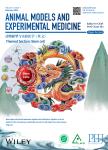Alcohol-induced Wnt signaling inhibition during bone fracture healing is normalized by intermittent parathyroid hormone treatment
Alcohol-induced Wnt signaling inhibition during bone fracture healing is normalized by intermittent parathyroid hormone treatment作者机构:Internal Medicine-Pediatric ResidentRush University Medical CenterChicagoILUSA Limb Lengthening and Complex Reconstruction FellowshipHospital for Special SurgeryNew YorkNYUSA Department of Orthopaedic Surgery and RehabilitationLoyola University Medical CenterMaywoodILUSA Alcohol Research Program(ARP)Loyola University Chicago Stritch School of MedicineMaywoodILUSA
出 版 物:《Animal Models and Experimental Medicine》 (动物模型与实验医学(英文))
年 卷 期:2020年第3卷第2期
页 面:200-207页
核心收录:
学科分类:1002[医学-临床医学] 100210[医学-外科学(含:普外、骨外、泌尿外、胸心外、神外、整形、烧伤、野战外)] 10[医学]
基 金:AO North America National Institute on Alcohol Abuse and Alcoholism,Grant/Award Number R21AA025551 and T32AA013527
主 题:ethanol fracture callus parathyroid hormone Wnt signaling pathway
摘 要:Nearly half of orthopaedic trauma patients are intoxicated at the time of injury, and excess alcohol consumption increases the risk for fracture nonunion. Previous studies show alcohol disrupts fracture associated Wnt signaling required for normal bone fracture repair. Intermittent parathyroid hormone(PTH) promotes bone growth through canonical Wnt signaling, however, no studies have investigated the effect of PTH on alcohol-inhibited bone fracture repair. Male C57 BL/6 mice received two-3 day alcohol binges separated by 4 days before receiving a mid-shaft tibia fracture. Postoperatively, mice received PTH daily until euthanasia. Wnt/β-catenin signaling was analyzed at 9 days post-fracture. As previously observed, acute alcohol exposure resulted in a 2-fold decrease in total and the active form of β-catenin and a 2-fold increase in inactive β-catenin within the fracture callus. Intermittent PTH abrogated the effect of alcohol on β-catenin within the fracture callus. Upstream of β-catenin, alcohol-treated animals had a 2-fold decrease in total LRP6, the Wnt co-receptor, which was restored with PTH treatment. Alcohol nor PTH had any significant effect on GSK-3β. These data show that intermittent PTH following a tibia fracture restores normal expression of Wnt signaling proteins within the fracture callus of alcohol-treated mice.



